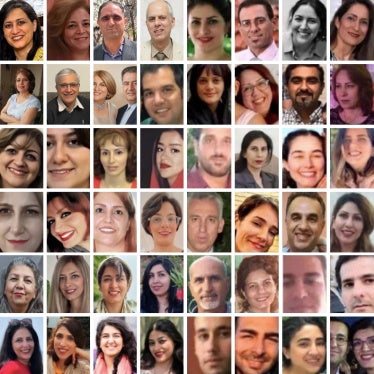The fate of two very different prisoners in Tunisia -- one Muammar al-Qaddafi's former prime minister, the other an unknown and irreverent cartoonist -- hints at the future course of this country that initiated the Arab Spring. The public outcry over the first case showed that many Tunisians consider respect for human rights to be integral to Tunisia's post-dictatorship identity. The relative silence over the second case shows that the strength of that human rights identity remains hostage to a difficult national conversation that has not taken place yet about free speech and religion.
As Qaddafi's rule over Libya was collapsing in September 2011, his prime minister, Al-Baghdadi Ali al-Mahmoudi, fled to Tunisia and was immediately incarcerated. Mahmoudi applied for asylum, and President Moncef Marzouki, a veteran human rights activist, declared that Tunisia must not return Mahmoudi as long as he risked mistreatment and an unfair trial in a still-roiling Libya. But on June 24, Prime Minister Hamadi Jebali of the Islamist Ennahda party announced the immediate transfer of Mahmoudi, while his asylum demand was still on appeal, saying Libya had given Tunisia assurances of fair treatment.
The ensuing outcry in Tunisia's National Constituent Assembly, including a vote of censure that nearly passed, had partly to do with a sentiment that Ennahda, the dominant member of the three-party governing coalition, was strong-arming rather than consulting its partners. Many Tunisians also saw the extradition as an act of realpolitik at the expense of the human rights values upon which the new Tunisia should be founded.
It was not long ago that Ennahda's leaders, then in exile, were pleading with foreign governments not to forcibly send Tunisian Islamists home, where they faced unfair trials or worse under President Zine el-Abidine Ben Ali.
On June 25, while the constituent assembly was acrimoniously debating the extradition of Mahmoudi the day before, a court issued a verdict no less consequential for the course of human rights in Tunisia.
The Monastir appeals court confirmed the seven-year prison sentence of two young men for caricatures that "disturbed the public order" and "offended public morality." Although it was the first time since the Tunisian revolution that a court has sentenced anyone to prison for a speech act, this development slipped by unnoticed. Only a small circle of Tunisian rights activists mounted a defense of the two men.
Granted, the "speech acts" of Jabeur el-Mejri and Ghazi Beji are not the easiest to defend. Beji, an atheist, posted online an essay purporting to show "the ugly face of Islam," accompanied by lewd caricatures of the Prophet Muhammad. Mejri then cut and pasted some of Beji's work on his own Facebook page. Mejri has been in prison since March, while Beji fled to Europe and applied for asylum.
Unlike many Muslim countries, Tunisia has no laws criminalizing blasphemy. However, the courts saw fit to apply broadly worded penal code provisions left over from the Ben Ali era, in response to a complaint filed by an Islamist lawyer who had come across the online postings.
Those postings would probably offend, if not shock, a substantial number of their compatriots. But if that is the measure of speech that merits prison time, post-revolutionary Tunisia is about to surrender its hard-won freedom of speech.
A significant number of Tunisians are just as offended by imams who brand as infidels anyone who doesn't practice Islam according to their precepts. Some feel physically endangered by the actions that this kind of rhetoric might incite -- in contrast to Mejri's and Beji's fulminations, which one can avoid simply by shunning their web pages.
But no preacher has faced prosecution for his sermons or imprecations. When the Egyptian cleric Wajdi Ghounim visited Tunisia in February and proclaimed on the radio, "Every person who does not abide by the law of God is an apostate," the Ennahda party declared that freedom of expression protected his declarations.
The national assembly has also largely ignored the emerging double standard over what constitutes permissible speech about religion. But the issue may move to center-stage when that body's drafting committees present their proposed constitution, likely at the end of July.
In March, the Ennahda party averted a battle with modernists by announcing it would not seek mention of sharia in the new constitution, opting instead to keep the present formulation in Article 1 recognizing Tunisia as a republic whose "religion is Islam."
Now, a new culture war may be brewing between Tunisians who want the constitution to robustly affirm rights, as they are enshrined in international treaties, and many in Ennahda who want an article that would penalize those who "harm" what is "sacred."
The old constitution proclaimed freedom of expression "according to the terms defined by the law." This condition allowed Ben Ali -- and President Habib Bourguiba before him -- to proffer that right with one hand and grab it back with the other. It would be regrettable if elastic notions of "harming the sacred" were to become a new basis for undermining free speech.
The row prompted by the extradition to Libya of Mahmoudi showed that many Tunisians want the post-Ben Ali state to be defined by human rights values. But the imprisonment of two atheists should provoke similar introspection: do Tunisians want constitutional and legal safeguards for free speech for all -- even speech that may be offensive to some, perhaps a majority -- drawing the line where international law draws it: at speech that incites to imminent violence or discrimination?
Conservatives will argue that Tunisians share deeply held values that deserve protection from those who would offend or provoke. But while Tunisians may be more than 99 percent Sunni Muslim, they run the gamut from devout to non-practicing, along with a sprinkling of atheists, Jews, and Christians. If cultural diversity constitutes one of the arguments for tolerating differences within Western democracies, why should Tunisians, in their diversity, be deprived of this argument in favor of the full enjoyment of their rights?
One thing is sure: if legislators vote to impose respect for the "sacred" as a restraint on free speech, or maintain laws criminalizing speech that "disturbs the public order," you can bet that those in power will end up applying such provisions in arbitrary and political ways -- just as the dictator they ousted did.
Eric Goldstein is deputy Middle East and North Africa director at Human Rights Watch.









